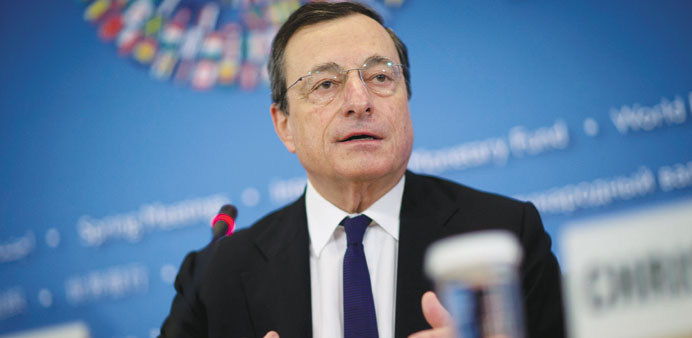Mario Draghi, president of the European Central Bank (ECB), speaks during a news conference at the International Monetary Fund and World Bank Group Spring Meetings in Washington earlier this month. Draghi gave his clearest indication yet yesterday that the ECB could print money to buy assets if inflation slows.
European Central Bank President Mario Draghi gave his clearest indication yet yesterday that the ECB could print money to buy assets if inflation slows, and identified a rise in the euro as a potential trigger for action.
While stressing that the ECB sees inflation remaining low for a prolonged period before rising towards its target of just below 2%, Draghi set out three scenarios for ECB action.
Reiterating the bank’s message that “the exchange rate is an increasingly important factor in our assessment of the outlook for price stability”, he said that all else being equal, a rise in the euro could also prompt the ECB to act.
Such a rise in the exchange rate would imply a tightening of monetary conditions with a downward impact on inflation, and so pose a potential threat to economic recovery in the 18 countries that use the euro, Draghi said.
“If so, this would call for policy action,” he added.
The euro fell to $1.3815 after Draghi’s comments were released from around $1.3835 before he spoke, regaining some ground later.
Markets are starting to tire of the ECB talking about the exchange rate without delivering policy action.
“We’ve had so much of this but no action and the economy seems to be going the other way - it’s getting stronger and stronger, which makes it more difficult to get a unanimous vote for more monetary policy easing in May or June,” said Berenberg bank economist Christian Schulz.
Earlier, the German Ifo business climate index showed a surprise increase in April as firms shrugged off concerns about tensions between the West and Russia over Ukraine.
Setting out three “contingencies” that could prompt an ECB policy response, Draghi said a worsening of the medium-term outlook for inflation “would be the context for a more broad-based asset purchase programme”.
The comments were the clearest indication yet from Draghi that the ECB would be prepared to embark on a full-blown quantitative easing (QE) programme — printing money to buy assets — if the inflation outlook were to deteriorate further.
Euro zone inflation is running at 0.5% — far below the ECB’s medium-term target — although Draghi again said the bank sees it remaining low for a prolonged period before gradually rising back towards 2%.
The ECB’s June policy meeting is growing in significance as economists expect an inflation reading due on April 30 to show a monthly rise. A Reuters poll points to a reading of 0.7%.
Any sign inflation is edging up would put the focus on updated ECB staff forecasts, which stretch to the end of 2016.
“If there is action, I still think based on what we know so far it is not going to be the most dramatic stuff like major asset purchases, but instead more on the negative deposit rate,” said Schulz.
ECB policymaker Ewald Nowotny pointed on Wednesday to the mid-year meeting as the time for a reassessment of the inflation outlook, although he downplayed risks of deflation in the bloc.
“We will only be able to really assess that in June, so I think that until then we should not take any measures,” Nowotny said. “For the ECB, there is no urgent need for action.”
As well as presenting the asset-buying idea for dealing with a weakening of the inflation outlook, Draghi set out a scenario for responding to “an undue tightening” of monetary conditions.
Should that happen, the ECB could respond with a variety of conventional measures, among them “a further lowering of the interest rate corridor, including a negative deposit rate”.
The fixed-rate, full allotment procedure — whereby the ECB lends banks as much money as they want at a fixed rate — could also be extended beyond the existing time-frame of July 2015. “Finally, if necessary, the measures could include new liquidity injections via our liquidity operations, including longer-term fixed-rate operations,” he said in his speech, entitled ‘Monetary Policy Communication in Turbulent Times’.
Under a final scenario in which the ECB’s policy transmission is further impaired, it could respond with “a longer-term refinancing operation targeted towards encouraging bank lending or an ABS purchase programme,” Draghi said.

